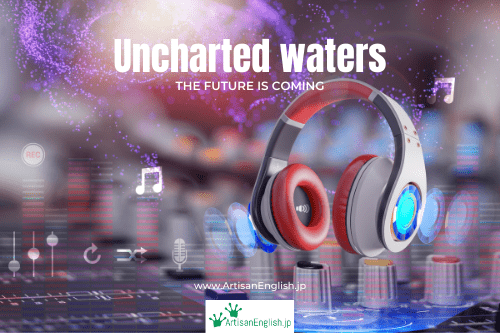
YouTube / iTunes / Spotify / Radio Public / Pocket Casts / Google Podcasts / Breaker / Overcast
Listen to ArtisanEnglish.jp posts & lesson intros here.
WotD: Uncharted waters
Welcome to uncharted waters.
You and I will soon have to face the challenges and opportunities in life after the pandemic.
Technology has advanced by leaps and bounds since we celebrated the New Year in 2020.
If you’re heading off into new and unknown areas, you’re going into uncharted waters.
Technology and change often lead to uncharted waters.
At that time, most of us used technology primarily for online shopping or having fun.
Now, we use it for work.
Soon, the Internet as we know it will be transformed into the Metaverse.
In a way, this pandemic is a catalyst for many of these changes.
It’s becoming hard to remember what life was like before the pandemic, but one would assume it was much more traditional and even quaint.
Now, we are heading off into new and unknown areas.
It will take longer than we think to recover from the challenges which the coronavirus has presented us.
However, in the process of doing so, there will be discoveries and new experiences to be had.
Eighteen months ago, online video conferencing was uncharted waters for many.
Now it’s old hat.
Yes, our lives have gone through many upheavals in a short period.
In some ways, these changes may be seen as unfavourable by some.
Change is creating a new world, unfamiliar and unexplored, fraught with challenges and opportunities at every turn.
Sometimes it feels like an adventure, but sometimes it’s just plain scary.
What does this mean for our careers?
It means that there are no rules.
We are the new adventurers sailing into uncharted waters.
There are no precedents.
The only way to gain experience and succeed in this new world is to embrace change.
Flesch-Kincaid Readability Test
This post is understandable by someone with at least a 7th-grade education (age 12).
On the Flesch-Kincaid reading-ease test, this post scores 70.
The easier a passage is to read, the higher the score on a scale of 0 – 100.

